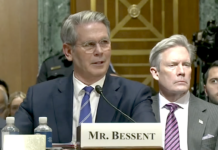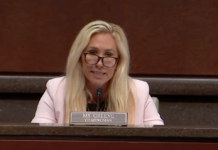
(GA Recorder) — As school buses full of sleepy-eyed children rolled down Highway 92 in Woodstock early Wednesday morning, Morgan Vagnasco parked her car in front of the RaceTrac and pulled out a red gasoline jug.
Every one of the pumps was occupied, and more morning commuters idled in the lot, ready to swoop in as soon as someone left.
Vagnasco thought she lucked out until she pulled the trigger on the pump.
“I found out last night there was a gas shortage, so I got up early and it’s already out,” she said Wednesday just after 7 a.m.
Stations across metro Atlanta have been cleaned out following the recent ransomware targeting Colonial Pipeline, the Alpharetta-based company that provides nearly half of the East Coast’s fuel.
The pipeline shutdown, which started Friday, caused a fuel frenzy in the Southeast and prompted Gov. Brian Kemp to declare a state of emergency Tuesday. The crisis has brought new attention to the cybersecurity threats facing the nation’s critical infrastructure, not to mention the role pipelines play in powering most automobiles.
What happens next hinges mostly on how quickly Colonial Pipeline can fully restore its operations. The company announced late Wednesday that it had begun that process. But the effects of the shutdown could linger for days even after the system is completely back online.

“Following this restart, it will take several days for the product delivery supply chain to return to normal,” the company said in a statement. “Some markets served by Colonial Pipeline may experience, or continue to experience, intermittent service interruptions during the start-up period.
“Colonial will move as much gasoline, diesel, and jet fuel as is safely possible and will continue to do so until markets return to normal,” the company added.
Unlike other recent fuel shortages, the current challenge has more to do with the ability to deliver fuel to retailers rather than problems with production or refining, said Paige Anderson, director of government relations at the National Association of Convenience Stores.
“The industry is in a unique situation where it is transitioning from winter blends to summer blends of fuel, and consumer demand is increasing as Memorial Day weekend approaches and the summer driving season kicks off,” Anderson said. “To make matters more complicated, there is a national labor shortage in the industry, including a deficit of truck drivers.”
As of midday Wednesday, more than 17% of Georgia gas stations reported being out of gas, according to data from GasBuddy.com.
Vagnasco, a billing specialist who works from home, took the defeat in stride and said she would try another station.
“I’m almost full, so I’m not really too worried about it because I don’t really drive anywhere,” she said.
Still, she said she’s hoping to have a little extra gasoline, “just in case this lasts a little longer.”
Others said they need gas to take care of their responsibilities, like 16-year-old Bella Hurst, who, with her mother, runs Harmony Farms, which is a boarding farm for horses in Canton near Lake Allatoona. She said they’ve been conserving gas to make sure they have enough to care for the horses.
“We have to go back and forth every day, and I go to school in Marietta, and she works in Marietta, so it’s kind of hard. We’re trying to save gas, so I’ve been doing school from home and stuff, but it’s just kind of a pain,” Hurst said as she filled up her pickup truck at a Canton Marathon station Wednesday. “But we’re getting through it, and everything’s being taken care of.”

A few pumps over, real estate agent Julian Olaley gave a sigh of relief as he filled up his tank. He had traveled north from Marietta – more than 10 miles – and not passed a single station with gasoline on hand to sell.
“I’m OK now that I’ve filled up my gas, but I don’t know what tomorrow is going to be like,” he said.
State and national leaders are urging people in the Southeast to buy only the gas they need and resist the urge to stockpile extra. Kemp has tried to reassure the public that the scarcity of gas seen in parts of the state is a short-term problem, driven partly by panic buying.
“Get what you need where you can get your kids to school, where you can get to work, where you can get to a medical appointment, but don’t unnecessarily fill up every vehicle you got, every can you got. Give others the opportunity to do the same,” Kemp said at a Wednesday afternoon press briefing.
Kemp said the state is working with the federal government and industry to get gas to stations as quickly as possible, even floating the idea of providing police escorts to fuel trucks on their way to gas stations.
The state does not currently anticipate the shortage will affect state services including public safety and education, Kemp said.
The U.S. Environmental Protection Agency Tuesday approved a request from the state to allow the use of winter fuel that was to be held in storage, which will be helpful, but not a solution in itself, Kemp said.
Also on Tuesday, Kemp signed an executive order to temporarily suspend Georgia’s gas tax through Saturday, increase the weight limits for trucks transporting fuel and prohibit price gouging.

Under Georgia’s price gouging statute, businesses cannot charge more for fuel than they did before the executive order unless there is a verifiable increase in cost the businesses pay to receive it. As of Wednesday afternoon, the state has received more than 300 complaints of price gouging, said Attorney General Chris Carr. Residents can report suspected violations online at www.consumer.ga.gov.
Georgia’s average gas price has spiked in the last week, but it still remains below the national average.
As of Wednesday gallon of regular will set you back $2.95 on average in Georgia, if you can find it. A week ago, it would have cost about $2.72. Nationally, drivers can expect to pay about $3 a gallon, according to data from AAA.
Southwest Georgia’s Clay County is home to the state’s priciest gas at an average of $3.19 a gallon, while residents of Warren County in east Georgia enjoy the cheapest average fill-up at $2.68 a gallon.
“The good news is there are an awful lot of cars on full and you can’t get more full than full,” Jeff Lenard, vice president of strategic industry initiatives with the convenience store association, said to reporters Wednesday. “So as new deliveries come in, the system will start to repair itself as long as there’s not more panic buying.”
Georgia Recorder Deputy Editor Jill Nolin contributed to this report.







